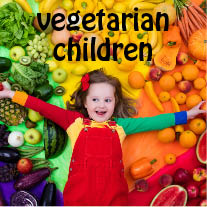Vegetarian Children

Vegetarian
feeding implies a diversified set of concepts, variants, advantages and
limitations for the health of those who practice it, ranging from a
simple restriction to red meat or a total restriction on the consumption
of food of animal origin, as well as food that in the animal
production, bring the animal a greater or lesser degree of suffering.
Among
the various types of vegetarian diets, the most restrictive is the
vegan diet! With total restriction on the consumption and use of
products that may derive from animal origin, with motivations not only
for health reasons, but especially adopted by a group of people who
defend and adopt life philosophies oriented towards this behavior and
lifestyle, not only in food.
There are concepts in nutrition
such as the biological value and bioavailability of nutrients, which
correspond to their "quality" and ability of the body to absorb and use
them effectively. It is also known that the same nutrient has different
bioavailabilities according to its origin and, for proteins, fat soluble
vitamins, certain mineral salts and essential fatty acids, the source
of animal origin is essential. That is to say, the fact that 100 g of
Galician cabbage has about twice the amount of calcium compared to 100
ml of half-fat milk does not mean that the former is more beneficial to
the human organism, but quite the opposite.
Life
stages in which there is a higher rate of growth, from pregnancy to
adulthood, should only be subject to restrictive diets in specific and
necessary cases. For all nutrients are essential to optimal physical,
intellectual and cognitive growth and development.
Again, the
Mediterranean diet and characteristically the Portuguese diet is one of
the most complete and balanced, and if we check its wheels and
educational pyramids, we easily realize that the largest and most
frequent dietary intake should in fact be in foods of vegetable origin,
but requiring the daily requirement of food of animal origin (dairy
products, eggs, meat and fish).
Starting in the pregnant woman, to
the baby, then the the child, to the adolescent and to the young, they
are examples of life stages in which not only varied food consumption
but also energy are necessary, as they are essential growth and
development phases. When we restrict food and limit it only to foods of
plant origin, this growth and development is at risk, resulting or
likely to result in deficiencies or even illness.
Total
substitution of food of animal origin with food of plant origin also
entails medium / long-term health risks, as in the case of milk and
soybeans (rich in aluminum, phytates and phytoestrogens).
In this
way, vegans are considered a risk group in nutritional terms and
consequently in terms of health in general. That is why they should
always seek the help of the nutritionist to try to approximate their
intake of the desired nutritional values and with the proper advice on
food supplementation, essential from an early age. Adolescents and young
vegans are, according to studies conducted and, for me, a real concern
at this level. In particular, there is a risk of iron deficiency anemia
and malnutrition, since it is an age when they are very selective,
practicing nutritionally restrictive feeds and, in addition, blood loss
during the menstrual period.
Although there are no specific
scientific studies and recommendations on vegan feeding at pediatric
ages, there are already some indications about dietary alternatives for
these cases, noting the need to strengthen the intake of oleaginous
fruits, vegetables, whole grains and horticultural crops, and that
introductions foods of plant origin comply with that recommended for
omnivorous food.

green card - dried leguminous plants
For the Mercearia Bio Green Card hol...
Read article



